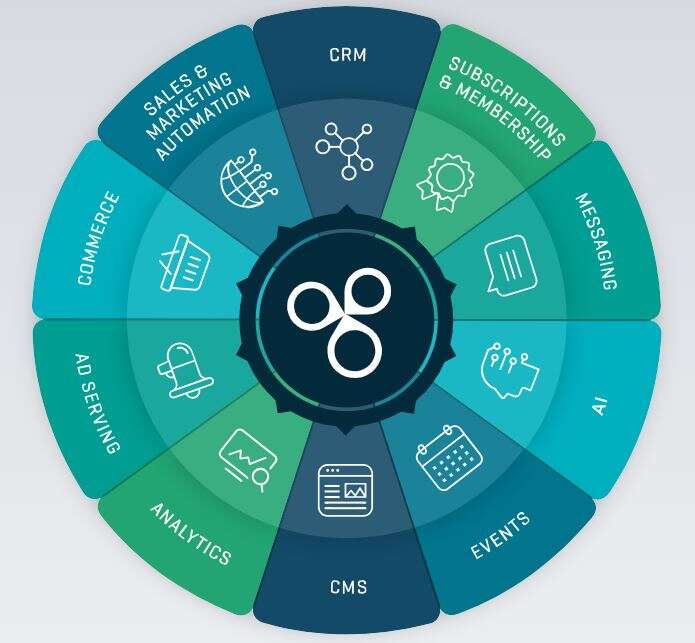
With news publishing on the open web increasingly under threat, a publishing platform which incorporates generative AI could yet give publishers the tools to fight back.
This is the view of Markus Karlsson the founder of a technology company which provides a complete suite of services for publishers and which is increasingly incorporating AI into its offering.
Karlsson’s new Affino 9 software, released in October, is a software-as-a-service (SaaS) media business platform that makes it easy for publishers to publish content and monetise it. It also provides a whole suite of essential services for media groups including CRM, events and awards management, ad delivery, analytics and a subscription platform.
The new version is underpinned by the latest generation of open source technologies, Amazon AWS services, and is built to be ready for AI.
The London-based company believes that AI tools such as Large Language Models (ChatGPT for example) will be fundamental to how software is developed and how media organisations produce and deliver content and experiences in the coming years.
Affino 9 contains a framework to train and support multiple LLMs so publishers can offer chatbots and other experiences ‘trained’ on their content, Karlsson explains.
“Artificial intelligence is going to change everything,” says Karlsson. “The best analogy is the start of the industrial revolution, when we developed steam power. That gave us physical abilities that we just didn’t have before as a species. AI will do that in terms of mental power and ability.”
He says: “We are just going into the acceleration of the curve, and it will be an exponential curve. That’s what people need to understand.”
Subs, events, awards, website and advertising all on one platform
Affino is a software-as-a-service platform which lets publishers engage audiences, and monetise them, and has existed since the early years of the consumer internet.
“We were around when Mosaic was still the best browser,” Karlsson says. Mosaic was among the first browsers to integrate media such as graphics, and was discontinued in 1997.
Karlsson says the company has thrived through subsequent tech revolutions including cloud and mobile, but believes AI will be the biggest of all.
Among their customers is theatre weekly The Stage, which was founded in 1880, and turned to Affino to consolidate and optimise its offering.
Karlsson says: “The Stage has websites, and runs advertising, and does millions of turnover in subscriptions, they run events, and awards, and do quite a few special projects: every part of that runs through Affino.”
The key benefit for The Stage is that all their hundreds of thousands of users have completely seamless experiences and user journeys, Karlsson says.
The software also pulls together all the commercial aspects from selling subscriptions to selling tickets.
Karlsson says: “There is just a huge breadth in terms of what it delivers as a platform.”

Publishing on the open web is broken
The traditional model of publishing on the open internet where news sites rely on traffic delivered via social media and search is breaking, Karlsson believes, suggesting that the web “might be dead as a business model”.
The current state of the web makes many websites unusable, with users challenged to switch off ad blockers even when not using them, thanks to software companies such as Apple and Mozilla blocking adverts.
He says: “There are no ads. Signups are broken. The whole user journey is messed up. That’s the web today for 90% of publishers out there.”
The difference with Affino is that it doesn’t try to capture personal information unless users sign up and give permission, meaning sites built with the software can work smoothly and earn money by charging a premium for advertising to known users.
He says: “We can show ads, show the content, and for the end user, they have a much, much better experience. That doesn’t exist on the web today.”
Google, Facebook and even LinkedIn are looking increasingly keen to keep users on their sites.
Karlsson says: “It’s very concerning for the media industry and the SEO industry. I’m not saying it will definitely come to an end – but I am putting money on it happening over the next couple of years, in the way I’m investing in the platform.
“People are going to have to change the way they work because otherwise the business they are running today is going to be dead.”
Platforms such as Google are already ingesting content and showing readers summaries of news, rather than links to publisher sites. Google is testing its Search Generative Experience with signed-in users in the US and elsewhere.
“The whole Silicon Valley mantra is to ask for forgiveness, not permission,” says Karlssson. “You can’t operate at the speed you’re going to need to to dominate the market by waiting to see what might be required by a regulatory environment.”
How publishers can harness generative AI
The new Affino 9 is built to be AI-ready, after Karlsson judged that the technology was ready for use professionally.
“I don’t know if we are future-proof, but we are future-ready,” he says. “The new version of Affino allows publishers to take content, articles, PDFs, forums and social content, and start training AIs: the interface is like ChatGPT but it’s based on publishers’ own content and data.”
The company is building new AI tools for Travel Trade Gazette publisher TTG Media, including a “news and insights” AI, and a tool which helps people find travel service providers.
Karlsson says: “They can sell it as a subscription service, or monetise it through advertising.”
He says: “We brought an AI foundation to our platform, and we’re giving our clients the ability to create AIs from their content. We are using it ourselves, and launched an AI chatbot which we have fed in all our Help Guides and FAQs. The bot is already able to answer around half the customer queries which arise.”
There are several key advantages to the technology, when it comes to using AIs to create content.
Karlsson says: “AIs will be around forever, they don’t leave the company, and they are remarkably cost-effective to operate.”
Affino 9 will “bake in” AI support into every management screen, offering advice on what people should do and how they should do it.
Karlsson says: “This is the biggest change since the internet came out: we’re going to spend the next couple of years enhancing all aspects of Affino’s services with AI, as well as those our clients deliver to their end users.”
Karlsson admits that he has had negative reactions around the use of AI, with some people “adamantly opposed” to the whole idea.
He says: “They don’t understand: It’s a force of nature. We’ve had machine learning for more than 20 years already. It’s happening anyway: it has already happened. If you use Google Search, or your Android or iPhone, even how images are shown on TV’s, and the way cars provide driving assistance are all AI enhanced”.
The company is now working towards a new version of Affino where users simply chat with the product and it will do everything from creating websites to launching an entire media business.
He says: “That’s the dream. And that’s what we’re working towards.”
Email pged@pressgazette.co.uk to point out mistakes, provide story tips or send in a letter for publication on our "Letters Page" blog

